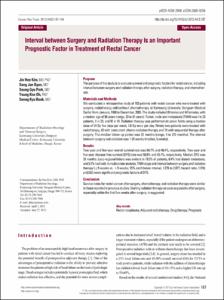Interval between Surgery and Radiation Therapy Is an Important Prognostic Factor in Treatment of Rectal Cancer
- Keimyung Author(s)
- Baek, Seong Kyu; Kim, Jin Hee; Oh, Young Kee
- Journal Title
- Cancer Research and Treatment
- Issued Date
- 2012
- Volume
- 44
- Issue
- 3
- Abstract
- Purpose : The purpose of this study is to evaluate survival and prognostic factors for rectal cancer, including interval between surgery and radiation therapy after surgery, radiation therapy, and chemotherapy.
Materials and Methods : We conducted a retrospective study of 153 patients with rectal cancer who were treated with surgery, radiotherapy with/without chemotherapy at Keimyung University Dongsan Medical Center from January, 1988 to December, 2005. The study included 89 males and 64 females, with a median age of 56 years (range, 23 to 81 years). Tumor, node and metastasis (TNM) was I in 23 patients, II in 39, and III in 91. Radiation therapy was performed on pelvic fields using a median dose of 54 Gy five days per week, 1.8 Gy once per day. Ninety two patients were treated with radiotherapy, 43 with concurrent chemo-radiation therapy and 18 with sequential therapy after surgery. The median follow-up period was 52 months (range, 4 to 272 months). The interval between surgery and radiation was 1-25 weeks (median, 5 weeks).
Results : Two-year and five-year overall survival rate was 64.7% and 46.4%, respectively. Two-year and five-year disease-free-survival (DFS) rate was 58.6% and 43.1%, respectively. Median DFS was 39 months. Loco-regional failure was evident in 10.5% of patients, 8.4% had distant metastasis, and 9.2% had both. In multivariate analysis, TNM stage and interval between surgery and radiation therapy (≤5 weeks vs. >5 weeks; 95% confidence interval, 1.276 to 2.877; hazard ratio, 1.916; p=0.002) were significant prognostic factors of DFS.
Conclusion : Survival rates for rectal cancer after surgery, chemotherapy, and radiation therapy were similar to those reported in previous studies. Starting radiation therapy as soon as possible after surgery, especially within the first five weeks after surgery, is suggested.
Key words: Rectal neoplasms, Adjuvant radiotherapy, Drug therapy, Prognosis
- Publisher
- School of Medicine
- Citation
- Jin Hee Kim et al. (2012). Interval between Surgery and Radiation Therapy Is an Important Prognostic Factor in Treatment of Rectal Cancer. Cancer Research and Treatment, 44(3), 187–194. doi: 10.4143/crt.2012.44.3.187
- Type
- Article
- ISSN
- 1598-2998
- Appears in Collections:
- 1. School of Medicine (의과대학) > Dept. of Radiation Oncology (방사선종양학)
1. School of Medicine (의과대학) > Dept. of Surgery (외과학)
- 파일 목록
-
-
Download
 oak-aaa-00841.pdf
기타 데이터 / 509.65 kB / Adobe PDF
oak-aaa-00841.pdf
기타 데이터 / 509.65 kB / Adobe PDF
-
Items in Repository are protected by copyright, with all rights reserved, unless otherwise indicated.